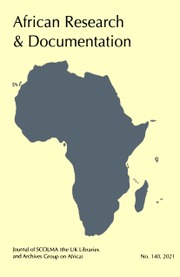Article contents
Electronic Journals and Africa Studies: An Overview and Some Trends
Published online by Cambridge University Press: 25 April 2022
Extract
Many commercial and non-commercial initiatives regarding electronic journals have started in the last decade. They are, however/so widespread and ad hoc that a complete overview of all online journals is not possible. This paper offers a brief description of the current state of affairs concerning electronic journals from and about Africa and highlights some of the trends.
Paper journals have existed since 1665 when the Philosophical Transactions of the Royal Society appeared in London and Le Journal des Scavans in Paris. A hundred years later more than ten scientific journals were available, mostly published by learned societies in Europe. And by 1850, there were well over a thousand journals with articles specialising in all different scientific fields from ethnology to medicine and geology to philosophy. By 1980 there were well over 180,000 different scientific journals.
- Type
- Articles
- Information
- Copyright
- Copyright © International African Institute 2009
Footnotes
Paper given as part of the panel on “African Studies on the web - new possibilities and new services for academic research”, 3rd European Conference on African Studies, Leipzig 4 June 2009.
References
Notes
4. Keynote address of Ismael Serageldin, director of the Bibliotheca Alexandrina at the BioVision Conference, Alexandria 14 April 2008 in which he stated: ‘the world risks “scientific apartheid” between rich and poor countries unless research and technology is better used to benefit the poor.’
- 1
- Cited by


